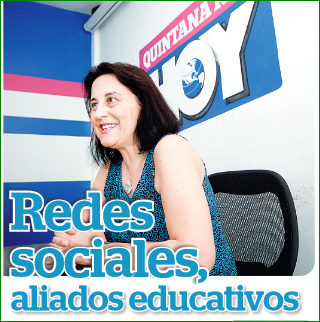ECO Project, led by UNED, the National Distance Education University in Spain, is a project financed by the CIP, Competitiveness and Innovation Programme by the European Commission, in which 24 partners, institutions, universities and companies from different countries participate.
Sara Osuna, Senior Lecturer at UNED Faculty of Education is European ECO Project Coordinator.
ECO, acronym for E-learning, Communication and Open Data: Massive Mobile, Ubiquitous and Open Learning is a proposal from UNED coordinated by UNED and run with other European institutions for the European Commission CIP call. ECO believes in a massive educational model, which was granted and approved by the European Commission, after successfully going through all its tests.
INTERVIEWER: Sara, which institutions participate in this European project ECO?
Sara Osuna: We are very lucky to have key European institutions, among them Sorbonne Nouvelle University, in France, the Open Universiteit in the Netherlands, Universidad Aberta in Portugal, Manchester University and Politecnico di Milano, in Italy. There are also universities in Spain, which participate in the project, such as Universidad de Oviedo, Universidad de Cantabria, Universidad de Valladolid, Universidad de Zaragoza, Universidad Loyola, in Andalusia, and UNED. Companies working on social media are going to participate too, along with these 11 universities. These companies are: Tabarca Consulting, Riverthia, ReimerIT, Eichler, Humance, Fedrave, EADTU, Editrain and Telefónica. Finally, guaranteeing all the work carried out by these universities and small, medium-sized and big companies, there are two non-European institutions, Universidad Manuela Beltrán, in Colombia and Universidad Nacional de Quilmes, in Argentina, which in some way are disseminating all this European Project in America.
INTERVIEWER: And, as Sara previously mentioned, UNED is coordinating this project. There are a lot of UNED teachers involved and they are under Sara Osuna’s coordination. Sara, what is the main aim of this project? ECO is an acronym that comprises essential distance and digital education concepts, Sara…
Sara Osuna: Indeed. The main aim of this project is the implementation of MOOCs (Massive Open Online Courses) in different languages. Partners will be in charge of a new kind of massive, online, open and free educational model. Every partner will design their courses in their own languages and English is the vehicular language in the project. That’s why our training is in Spanish, English, German, Italian, Portuguese and French. It is actually an important proposal to involve every current social communication process, every social media strategy, and every mobile-learning technology with the actual idea of mobile and ubiquitous learning. These are extremely important concepts nowadays and they will be for the future in Europe. That’s how the European Commission has interpreted it anyway, when they approved the project. In short, ECO project puts forward new and innovative ways of building knowledge for educators and trainers of trainers, that is, everyone in charge of educating today and tomorrow’s European citizens will be able to be trained with us in the project.
INTERVIEWER: Some final goals have just been pointed out, but I would like to know more on the duration of the project. This is a medium-term project of three years, which is the duration scheduled for, at least, this first stage. That is a lot of work ahead, Sara…
SARA OSUNA: Yes, three years of intense work. At first, we must analyse and assess the situation of MOOCs in Europe and internationally. Then we will have to design a technological architecture coherent with the connectivist learning approach we have proposed for the different MOOCs in ECO. Our commitment is training more than 50,000 European teachers.
INTERVIEWER: European teachers from all universities and institutions participating in the project, right?
SARA OSUNA: Exactly, but we don’t stop at this because there is a further commitment which is that the 4,000 teachers who get the best scores in the courses designed inside the project, will be provided with a technological platform so that they can design their own MOOCs and have their own students. This implies an iterative process that may cater for educational quality for a large population.
PRESENTADORA: We are talking about digital learning, communication and open resources, about mobile, ubiquitous, massive, open… and free courses?
SARA OSUNA: Yes, free. MOOCs are free by definition. In short, we want to raise European citizens and institutions’ awareness of the advantages of these open resources. Our final goals depend on understanding today’s social changes from the analogue to the digital model, from the point of view of the educommunicative model we have been working on for a long time. We want to integrate ICTs into the whole educational process but we also want to integrate social media strategies that identify with people’s needs today. We are going to collaborate in the building of knowledge of European citizens who need to learn throughout their lives. This is quite an ambitious goal and it is definitely our final goal; a goal the European Union approved.



